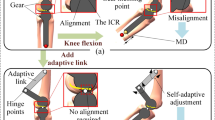Abstract
Against the needs for matching analysis of mechanical system human-machine interface, a 5-DOF motion model of human upper limb used to design analysis of human-machine controlling interface was created based on the principles of anthropometry, human anatomy and robot mechanism, which can simulate movement of human upper limb and calculate the position and posture of the palm center. With the human upper limb posture as the optimizing object, an optimizing model of comfortable operation of human upper limb was built, and the best posture of comfortable operation of human upper limb can be gained by solving the model. The CATIA simulation analysis and experimental study showed that the optimizing model is reasonable and practical. Take the layout design of gear shift lever in car as an example, the corresponding comfortable posture and comfort curves were obtained through the optimizing model. The research results can provide optimizing analysis for proper match of the mechanical system human-machine controlling interface of vehicle, tractor, tank and so on, and have important technology significance for improving the amenity of mechanical system human-machine controlling interface design and human-machine work efficiency.
Preview
Unable to display preview. Download preview PDF.
Similar content being viewed by others
References
Zhou, D.: Talking about the Design of Human-Engineering. Journal of Heifei University of Technology 17(6), 162–164 (2003)
Li, Z., Wang, C.: Research on Driver Fatigue and Ergonomics Design of Autmoive. Machine Design and Manufacturing Engineering 30(5), 12–14 (2001)
Leibowitz, Owens, Tyrrell: The Assured Clear Distance Ahead Rula: Implications for Nighttime Traffic Safety and the Law. Accident Analysis & Prevention 30(1), 93–99 (1998)
Han, X., Hong, J., Ti, Z., et al.: Biomechanics-based Evaluating Criteria on the Ergonomic Performance in Vehicle Driving. In: The 16th CIRP International Design Seminar, Kananaskis, Canada, pp. 531–535 (2006)
Ti, Z.: Bio-mechanics-based Evaluating Criteria on the Ergonomic Performance in Vehicle Driving. Xi’an Jiaotong University, Xi’an (2006) (in China)
Yu, B., et al.: Anatomy of Movement, Sports Medicine Dictionary. Sports people Press (2000) (in China)
Ma, X.: Robot Mechanism. China Machine Press, Beijing (1991) (in China)
Heinsalmi, P.: Method to measure working posture loads at working site (OWAS), The Ergonomics of Working Postures, pp. 100–104. Taylor & Francis, London (1986)
Dempsey, P.G.: Usability of the revised NIOSH lifting equation. Ergonomics 45(12), 817–828 (2002)
McAtamney, L., Corlett, E.N.: RULA: a survey method for the investigation of work-related upper limb. Applied Ergonomics 24(2), 91–99 (1993)
Zhang, E., Jun, H., Jian, L., et al.: Design and Analysis of a Test Stand for Biomechanics of Man-Machine Interface in Automobile Driving. Journal of X’ian Jiaotong University 40(5), 531–535 (2006)
zhenghe, S.: Study on optimal design method of human-machine interface in mechanical system. China agricultural university doctoral dissertation, Beijing (2000) (in China)
Author information
Authors and Affiliations
Editor information
Editors and Affiliations
Rights and permissions
Copyright information
© 2008 Springer-Verlag Berlin Heidelberg
About this paper
Cite this paper
Zhang, E., Li, Y., Liu, M., Liu, Z. (2008). Modeling and Optimizing of Human Upper Limb Posture of Mechanical System Human-Machine Interface. In: Xiong, C., Huang, Y., Xiong, Y., Liu, H. (eds) Intelligent Robotics and Applications. ICIRA 2008. Lecture Notes in Computer Science(), vol 5314. Springer, Berlin, Heidelberg. https://doi.org/10.1007/978-3-540-88513-9_61
Download citation
DOI: https://doi.org/10.1007/978-3-540-88513-9_61
Publisher Name: Springer, Berlin, Heidelberg
Print ISBN: 978-3-540-88512-2
Online ISBN: 978-3-540-88513-9
eBook Packages: Computer ScienceComputer Science (R0)




